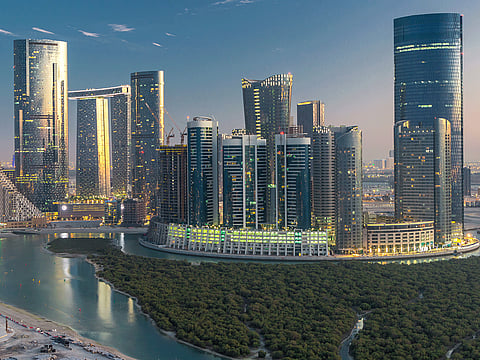Abu Dhabi GDP hits Dh291 billion in Q1 2025, non-oil growth seen at 6.1%
Manufacturing, construction, finance drive expansion as non-oil GDP crosses 56% of output

Dubai: Abu Dhabi’s economy expanded by 3.4% year-on-year in the first quarter of 2025, reaching a total Gross Domestic Product (GDP) of Dh291 billion, according to data released by the Statistics Centre - Abu Dhabi (SCAD). The non-oil sector played a leading role in this growth, surging 6.1% to Dh163.6 billion — its highest share ever in a first-quarter period.
For the first time, non-oil activities accounted for 56.2% of the emirate’s total GDP, while the oil sector contributed 43.8%, or Dh127.4 billion. Officials credited this shift to Abu Dhabi’s long-term economic diversification strategy, which has emphasised sectors like advanced manufacturing, finance, logistics, and real estate.
“Day after day, Abu Dhabi’s economy is reaffirming the success of the emirate’s long-term strategy,” said Ahmed Jasim Al Zaabi, Chairman of the Abu Dhabi Department of Economic Development (ADDED). “Our Falcon Economy orchestrates multi-dimensional strategies across different sectors, enabling us to build synergies and achieve our strategic goals.”
Manufacturing, construction, finance in focus
The manufacturing sector remained the biggest contributor to the non-oil economy, generating Dh28.5 billion in value — a 5% increase from Q1 2024. It now makes up 9.8% of the emirate’s GDP. Growth was supported by a 4.7% rise in new industrial licences and a 65% jump in factories progressing from construction to full operation.
Construction also showed robust momentum, expanding by 10.2% to Dh27.5 billion. The sector now contributes 9.4% of GDP, supported by infrastructure projects and AI-powered platforms like Binaa, aimed at fast-tracking permit approvals and enhancing efficiency.
The finance and insurance sector recorded a 9.1% jump to Dh19.6 billion, contributing 6.7% of GDP. Abu Dhabi Global Market (ADGM) saw a 43% increase in registered financial institutions and a 33% rise in assets under management. Foreign investment sentiment remained strong, with net foreign inflows into Abu Dhabi Securities Exchange (ADX) up 151% to Dh8.5 billion.
Retail, real estate, logistics see steady gains
Retail and wholesale trade grew by 3.6% to Dh16 billion, benefiting from population growth and tourism recovery. The transportation and storage sector expanded by 7.5%, reflecting Abu Dhabi’s increasing role as a regional logistics hub.
Real estate activities increased by 6.7%, tied to ongoing residential and commercial developments. Health services grew 5.2%, while arts, entertainment, and professional services saw upticks of 8.4% and 10.3%, respectively — pointing to Abu Dhabi’s strengthening position in the knowledge economy and cultural tourism.
“The first quarter of 2025 reaffirms the strength, adaptability, and maturity of Abu Dhabi’s economic model,” said Abdulla Gharib Alqemzi, Director General of SCAD. “As the population grows, our data shows that sustainable growth is not only continuing — it’s accelerating.”
Abu Dhabi’s population reached 4.14 million in 2024, up from 3.8 million the year before. The emirate is also moving ahead with its Dh13 billion Digital Strategy for 2025–2027, aimed at making Abu Dhabi the world’s first fully AI-native government by 2027. The initiative is expected to enhance public service delivery and accelerate innovation-led economic expansion.
Sign up for the Daily Briefing
Get the latest news and updates straight to your inbox



